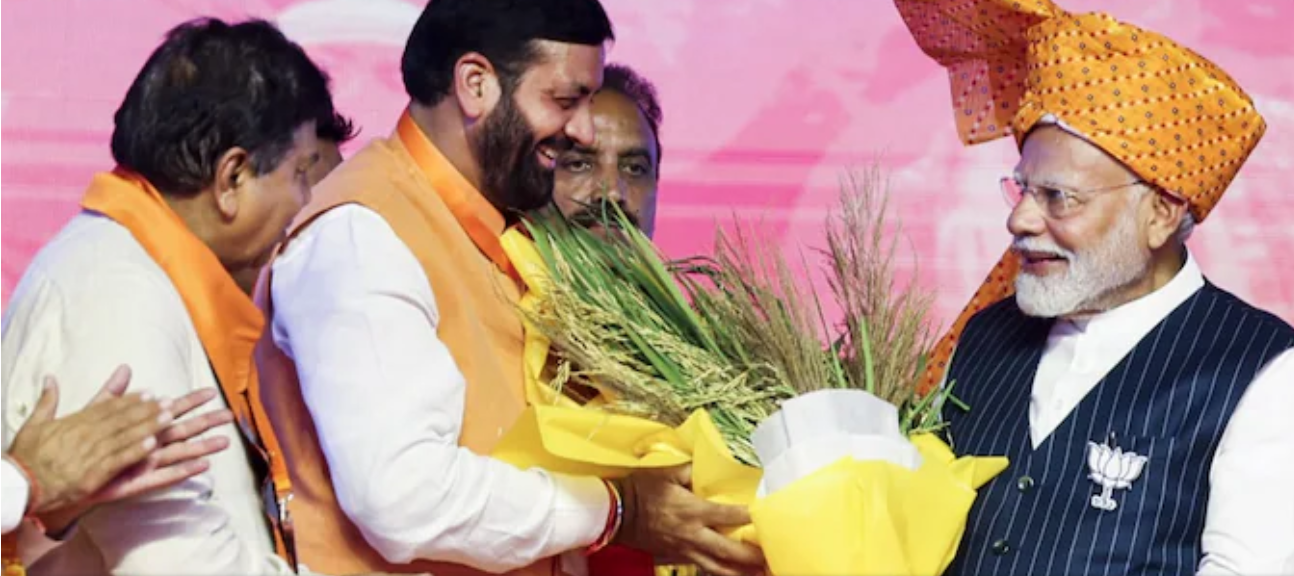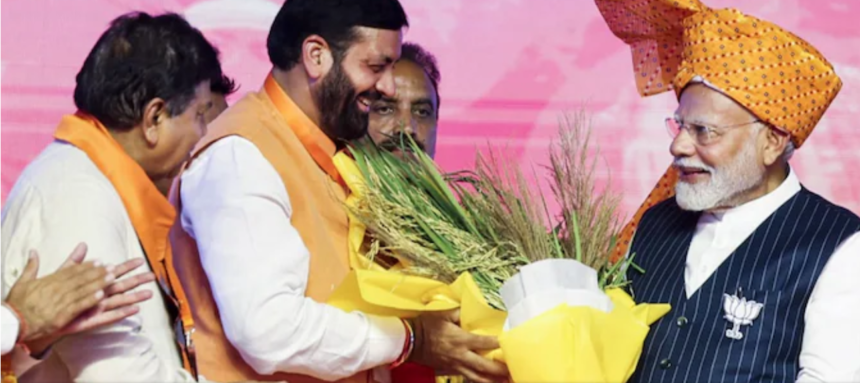Causes Instability a recent public meeting in Hisar, Haryana, Prime Minister Narendra Modi launched a blistering attack on the Indian National Congress, branding the party as “anti-Dalit” and accusing it of fostering instability in the nation. Modi’s statements come in the context of the upcoming Assembly elections and are indicative of the BJP’s strategy to rally support by highlighting the alleged failures of the Congress party, Causes Instability particularly regarding its commitment to the Dalit community and national security. This article explores the implications of Modi’s remarks, the historical context of Dalit politics in India, Causes Instability and the broader impact on the political landscape.
The Context of Modi’s Remarks
Prime Minister Modi’s statements came during a critical phase of political campaigning, as the BJP aims to consolidate its base in Haryana ahead of the Assembly elections. The Prime Minister’s speech was not only a critique of the Congress party but also an attempt to position the BJP as the party that truly champions the rights and welfare of Dalits and other marginalized communities in India.
In his speech, Modi claimed that the Congress party had consistently failed to deliver on key promises, particularly regarding the One Rank, One Pension (OROP) scheme, which is a significant issue for the armed forces and their families. The Prime Minister asserted that while the Congress had made promises to the military personnel, it had failed to implement them effectively. He alleged that the Congress party was more aligned with “enemies of the nation” than with the interests of the armed forces, Causes Instability framing the BJP as the only party that respects and prioritizes national security.
The Historical Context of Dalit Politics in India
Dalit politics in India has a complex history, deeply intertwined with the broader struggle for social justice and equality. The term “Dalit” refers to those who were historically marginalized and subjected to discrimination, primarily from the Scheduled Castes (SC) communities. The fight for Dalit rights gained momentum during the 20th century, particularly with the emergence of leaders like Dr. B.R. Ambedkar, Causes Instability who championed the cause of social justice and the rights of the oppressed.
The Congress party, which played a significant role in India’s independence movement, initially sought to address the issues faced by Dalits. However, over the decades, critics have argued that the party’s commitment to Dalit welfare waned, particularly after the 1980s, Causes Instability when regional and caste-based political parties began to emerge. The rise of parties like the Bahujan Samaj Party (BSP) and the Rashtriya Janata Dal (RJD) shifted the focus of Dalit politics, often sidelining the Congress party’s influence among these communities.
The BJP, on the other hand, has attempted to reframe its narrative in recent years, positioning itself as a party that prioritizes the welfare of Dalits. This strategy is evident in the appointment of Dalit leaders within the party and efforts to address issues pertinent to the community. Modi’s recent remarks can be seen as part of this broader strategy to consolidate support among Dalit voters in Haryana and beyond.  For the more information click on this link
For the more information click on this link
Modi’s Critique of Congress: Analyzing the Claims
Modi’s assertion that Congress is “anti-Dalit” is rooted in the party’s perceived neglect of Dalit issues over the years. Critics of the Congress party argue that its approach to Dalit politics has been inconsistent and often motivated by electoral considerations rather than genuine concern for social justice.
The Prime Minister’s reference to the OROP scheme also reflects a broader discontent among ex-servicemen and their families, Causes Instability many of whom feel betrayed by past governments. The BJP has made significant efforts to address this concern, promoting the narrative that only the BJP can ensure the welfare of armed forces personnel and their families. By directly linking the Congress party’s failures to national security and the welfare of Dalits, Modi aims to create a dichotomy between the BJP’s commitment to these issues and Congress’s alleged indifference.
The Implications for Political Dynamics in Haryana
Haryana, a state with a significant Dalit population, has witnessed a shift in political loyalties in recent years. The BJP’s outreach to Dalits, particularly through welfare schemes and social programs, has been a critical aspect of its strategy to strengthen its electoral base in the state. Modi’s statements serve to galvanize this support, framing the BJP as a protector of Dalit rights and a defender of national integrity.
The Congress party, meanwhile, Causes Instability faces the challenge of countering these claims effectively. The party has historically relied on its legacy of social justice but must demonstrate a renewed commitment to addressing the needs and aspirations of Dalit communities. This challenge is compounded by the fact that the BJP has been successful in portraying the Congress as a party of the elite, disconnected from the realities of marginalized communities.
The Role of Caste in Indian Politics
Caste continues to play a crucial role in shaping the political landscape of India. The dynamics of caste politics have evolved, with various parties attempting to appeal to specific caste groups. The BJP’s strategy to consolidate support among Dalits involves not only rhetoric but also policy initiatives aimed at improving the socio-economic conditions of marginalized communities.
Modi’s remarks also reflect an understanding of the importance of identity politics in India. By labeling the Congress as “anti-Dalit,” he seeks to create a narrative that resonates with Dalit voters and fosters a sense of unity among the community. The BJP has historically focused on Hindutva as a unifying ideology, but the inclusion of Dalit issues in this framework allows the party to broaden its appeal.
Countering the Narrative: Congress’s Response
In response to Modi’s claims, Causes Instability the Congress party has sought to highlight its historical contributions to Dalit welfare and social justice. Party leaders have accused the BJP of using Dalit issues as a political tool while failing to deliver on promises made to the community. The Congress party’s challenge lies in articulating a clear vision for Dalit empowerment and presenting a credible alternative to the BJP’s narrative.
Congress has also emphasized its commitment to addressing issues such as poverty, unemployment, Causes Instability and social discrimination, which disproportionately affect Dalits. The party’s leadership has called for a renewed focus on inclusive development, arguing that genuine progress for Dalits can only be achieved through structural reforms and policy initiatives that address systemic inequalities.
The Broader Impact on National Politics
Modi’s attack on the Congress party is not just limited to Haryana; it resonates on a national scale as the BJP seeks to solidify its position as the dominant political force in India. The rhetoric surrounding Dalit rights and national security has the potential to influence the BJP’s electoral prospects in other states with significant Dalit populations, particularly in the run-up to the 2024 general elections.
The emphasis on national security, especially in light of ongoing geopolitical tensions, allows the BJP to frame itself as a party that prioritizes the safety and welfare of its citizens. This strategy has been effective in galvanizing support among various demographics, Causes Instability including urban middle-class voters who view national security as a paramount concern.
Conclusion: The Future of Dalit Politics
Prime Minister Modi’s characterization of the Congress party as “anti-Dalit” underscores the complexities of caste dynamics in Indian politics. As the BJP positions itself as the champion of Dalit rights and national integrity, Causes Instability the Congress party faces significant challenges in countering this narrative.
The upcoming Assembly elections in Haryana and the 2024 general elections will be critical in determining the trajectory of Dalit politics in India. The BJP’s ability to consolidate support among Dalits, coupled with its emphasis on national security, Causes Instability may reshape the political landscape. Conversely, the Congress party’s response and commitment to addressing the concerns of marginalized communities will be vital in regaining lost ground.
In this evolving political environment, the fate of Dalit rights and the broader struggle for social justice will depend on the actions and commitments of political parties, Causes Instability as well as the resilience of Dalit communities in advocating for their rights and aspirations. The coming months will be pivotal as parties navigate these complex issues, and the electorate responds to their respective visions for the future of India. ALSO READ:-India Seeks Bids to Supply 6,000 MW of Green Power: A Leap Towards Renewable Energy Sustainability






29301 front windshield replacement
29306 auto glass mobile service
mobile auto glass 29301
This post shines with passion and energy — fantastic!
Completely captivated from beginning to end — amazing!
You’ve clearly done your research, and it shows.